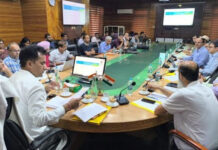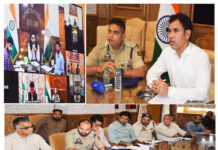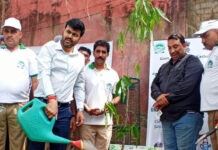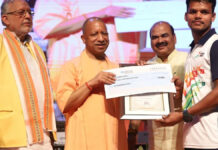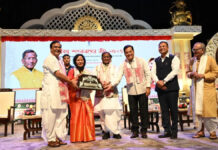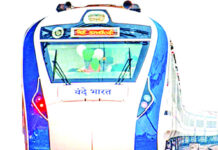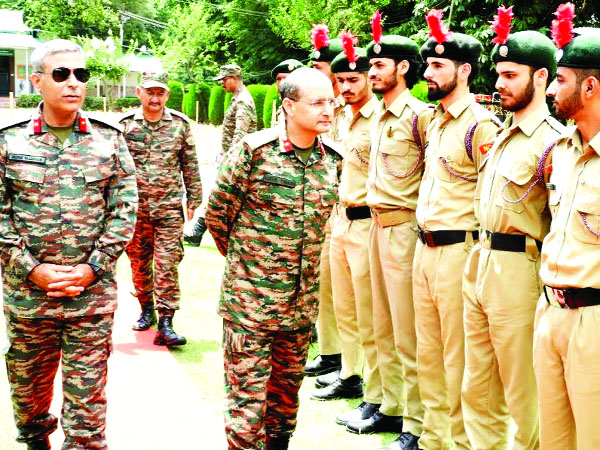DOGRA HERALD BUREAU
SRINAGAR, jULY 17
Brigadier Deepak Sajjanhar, SM, Group Commander of the National Cadet Corps (NCC) Srinagar Group, visited the ongoing Military Hospital (MH) attachment camp for NCC cadets at 92 Base Hospital (BH) today. The camp, which started on July 11 and is set to run until July 22, is being organized by the 1 Jammu & Kashmir Battalion NCC. Its primary aim is to provide 34 NCC cadets, comprised of 17 boys and 17 girls, with crucial life-saving medical skills through a structured program of both theoretical instruction and practical training.
Upon his arrival at the camp, Brigadier Sajjanhar began his visit by inspecting the living arrangements and administrative facilities provided for the cadets at APS BB Cantt in Srinagar. He took a thorough tour of the accommodation and dining facilities, assessing the overall conditions to ensure that the cadets’ requirements were being adequately met. This inspection was a critical part of his visit, demonstrating his commitment to maintaining high standards for the cadets’ comfort and well-being during the camp.
Following the inspection, Brigadier Sajjanhar proceeded to the auditorium at 92 Base Hospital, where he was given a detailed briefing on the medical training program being conducted for the cadets. The training sessions, led by experienced Indian Army doctors and nurses from 92 BH, cover a wide range of medical skills. The curriculum includes both theoretical lessons and hands-on practice, designed to equip the cadets with essential life-saving techniques that will benefit them both in their future military careers and in their daily lives.
In his address to the cadets, Brigadier Sajjanhar highlighted the importance of striving for excellence in the acquisition of these fundamental medical care skills. He emphasized how these skills are not only vital for their roles in the NCC but also have broader applications in various aspects of their lives. He encouraged the cadets to embrace the challenges presented by the camp as opportunities for growth and learning. His speech also touched on the broader objectives of the NCC, stressing how the organization prepares young people for future challenges and leadership roles.
During his visit, Brigadier Sajjanhar took the opportunity to gather feedback from the cadets about their training experiences and any administrative issues they might be encountering. This interaction underscored his dedication to improving the quality of the camp and addressing any concerns raised by the cadets.
In addition to his engagement with the cadets, Brigadier Sajjanhar also met with Brigadier Nikhil Tiwari, Commandant of 92 Base Hospital. The discussion between the two officers focused on enhancing cooperation and synergy between their respective organizations, aiming to strengthen future collaborative efforts and improve the effectiveness of training programs.
The visit concluded with a tea gathering attended by the Commandant and officers of 92 Base Hospital, the NCC cadets, Associate NCC Officers (ANOs), Junior Commissioned Officers (JCOs), Non-Commissioned Officers (NCOs), and other participants in the camp. The informal gathering provided an opportunity for interaction among the participants and concluded with a group photograph capturing the collective spirit of the camp.
Brigadier Sajjanhar’s visit underscored the NCC’s ongoing commitment to nurturing leadership and skill development among the youth of the region. Through initiatives such as this Military Hospital attachment camp, the NCC aims to prepare young individuals for future challenges with a sense of confidence and competence. The camp represents a vital component of the NCC’s efforts to provide practical, life-saving training to its cadets, helping to shape the future leaders of the nation.
Key Aspects of the Visit:
Inspection of Facilities: Brigadier Sajjanhar assessed accommodation and administrative arrangements at APS BB Cantt.
Medical Training Briefing: He received a detailed overview of the medical training being provided at 92 Base Hospital.
Cadet Engagement: Addressed the cadets, emphasizing the importance of medical skills and the challenges of the camp.
Feedback Collection: Gathered feedback from the cadets on their training experience and administrative concerns.
Acknowledgments: Expressed gratitude to Chinar Corps, 31 Sub Area, and 92 Base Hospital for their support.
Strategic Meeting: Engaged in discussions with Brigadier Nikhil Tiwari to explore future collaborations. Tea Gathering: The visit concluded with a tea session and a group photograph with all participants. Through such dedicated initiatives, the NCC continues to play a crucial role in developing the next generation of leaders and equipping them with the skills needed for future challenges.

